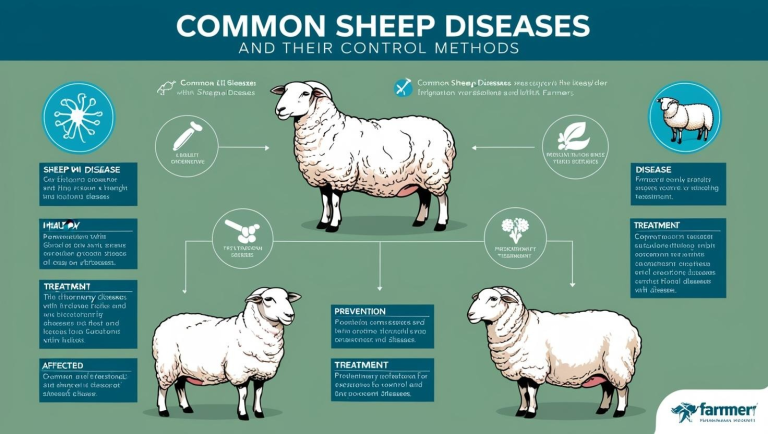Sheep farming is a profitable and sustainable agricultural practice, but it comes with challenges, including disease management. Sheep are susceptible to various diseases caused by bacteria, viruses, parasites, and environmental factors. Effective disease control involves proper nutrition, vaccination, biosecurity measures, and prompt treatment. This article explores common sheep diseases, their symptoms, prevention strategies, and control methods.
Bacterial Diseases in Sheep
Click HERE to join our WhatsApp group
1. Foot Rot
Cause: Bacteria (Dichelobacter nodosus and Fusobacterium necrophorum).
Symptoms: Lameness, swelling between the hooves, foul-smelling discharge.
Prevention and Control:
Regular hoof trimming.
Foot baths with zinc sulfate or copper sulfate.
Maintaining dry and clean environments.
Treating infected sheep with antibiotics.
READ ALSO: Leptospirosis in Pigs
2. Caseous Lymphadenitis (CLA)
Cause: Corynebacterium pseudotuberculosis.
Symptoms: Abscesses in lymph nodes, weight loss, reduced wool and meat quality.
Prevention and Control:
Isolate infected animals.
Disinfect shearing equipment.
Vaccinate against CLA.

3. Pneumonia
Cause: Pasteurella multocida and Mannheimia haemolytica.
Symptoms: Coughing, nasal discharge, fever, difficulty breathing.
Prevention and Control:
Provide well-ventilated shelters.
Reduce stress factors such as overcrowding.
Treat with antibiotics and anti-inflammatory drugs.
Viral Diseases in Sheep
4. Blue Tongue Disease
Cause: Bluetongue virus transmitted by biting midges.
Symptoms: Swollen tongue, excessive drooling, fever, lameness.
Prevention and Control:
Vaccination.
Vector control through insecticides and pasture management.
Avoiding grazing in insect-infested areas during peak seasons.
READ ALSO: Salt Poisoning In Pig (must read for every pig farmers)
5. Ovine Progressive Pneumonia (OPP)
Cause: Lentivirus.
Symptoms: Chronic weight loss, respiratory distress, mastitis.
Prevention and Control:
Test and cull infected animals.
Maintain a closed flock to prevent the introduction of infected sheep.
Provide good nutrition and stress management.
6. Contagious Ecthyma (Orf)
Cause: Orf virus.
Symptoms: Scabby lesions around the mouth, nostrils, and hooves.
Prevention and Control:
Vaccination.
Avoiding direct contact between infected and healthy sheep.
Wearing gloves when handling infected animals (as it can infect humans).
Parasitic Diseases in Sheep
7. Internal Parasites (Worm Infestation)
Cause: Haemonchus contortus, Trichostrongylus spp., Ostertagia spp.
Symptoms: Anemia, diarrhea, poor weight gain, bottle jaw.
Prevention and Control:
Regular deworming with anthelmintics.
Rotational grazing to break the parasite life cycle.
READ ALSO: Danger of Early Iron Injection in Piglet
Proper manure management.

8. External Parasites (Lice, Mites, Ticks, and Fleas)
Cause: Psoroptes ovis, Bovicola ovis, Ixodid ticks.
Symptoms: Itching, wool loss, skin irritation, anemia.
Prevention and Control:
Use of insecticides and acaricides.
Quarantine new animals before introduction.
Regular inspection and shearing.
Nutritional and Metabolic Diseases in Sheep
9. White Muscle Disease (Nutritional Myopathy)
Cause: Selenium and vitamin E deficiency.
Symptoms: Weakness, difficulty standing, sudden death in lambs.
Prevention and Control:
Supplementation with selenium and vitamin E.
Providing mineral-rich feed.
10. Pregnancy Toxemia (Ketosis)
Cause: Energy deficiency in late pregnancy due to inadequate nutrition.
Symptoms: Lethargy, incoordination, refusal to eat.
Prevention and Control:
Providing high-energy feed during late pregnancy.
Avoiding excessive fat accumulation in pregnant ewes.
Administering glucose solutions for affected animals.
READ ALSO: Infectious Bursal Disease(Gumboro) in Poultry
11. Hypocalcemia (Milk Fever)
Cause: Calcium deficiency, often in late pregnancy or early lactation.
Symptoms: Muscle tremors, inability to stand, collapse.
Prevention and Control:
Calcium supplementation before and after lambing.
Avoiding high-potassium feeds that interfere with calcium metabolism.
Preventive Measures for Sheep Diseases
Vaccination Programs: Implement regular vaccination schedules against major bacterial and viral diseases.
Biosecurity Measures: Quarantine new animals, disinfect equipment, and limit visitor access.
Proper Nutrition: Balanced diet with necessary minerals and vitamins to prevent metabolic diseases.
Pasture and Housing Management: Maintain clean, dry, and well-ventilated housing to reduce the risk of infections.
Regular Health Checks: Monitor animals for early signs of disease and seek veterinary assistance promptly.
Conclusion
Disease control is essential for maintaining a productive and profitable sheep farm. By implementing proper preventive strategies, providing quality nutrition, and ensuring timely veterinary care, farmers can reduce disease risks and enhance the overall health and performance of their flocks. A well-managed sheep health program leads to increased productivity, reduced losses, and sustainable sheep farming.
READ ALSO: Contagious Caprine Pleuropneumonia in Goats
Contagious Caprine Pleuropneumonia (CCPP) is a highly infectious respiratory disease that affects goats and is caused by the bacterium Mycoplasma capricolum subsp. capripneumoniae (Mccp). It is considered one of the most economically significant diseases in goat farming, leading to high morbidity and mortality rates in affected herds. CCPP is a transboundary animal disease that poses a serious threat to goat populations, particularly in Africa, Asia, and parts of Europe and the Middle…
READ ALSO: Ration Balancing for Maximum Productivity
Ration balancing is a critical aspect of livestock nutrition that ensures animals receive the right proportions of nutrients to maintain health, maximize productivity, and optimize feed efficiency. Whether raising dairy cattle, beef cattle, poultry, sheep, or goats, providing a well-balanced diet enhances growth rates, milk yield, reproduction, and overall animal performance…
Click HERE to join our WhatsApp group

